FATHER OF THE MODERN HEBREW LANGUAGEPart 1
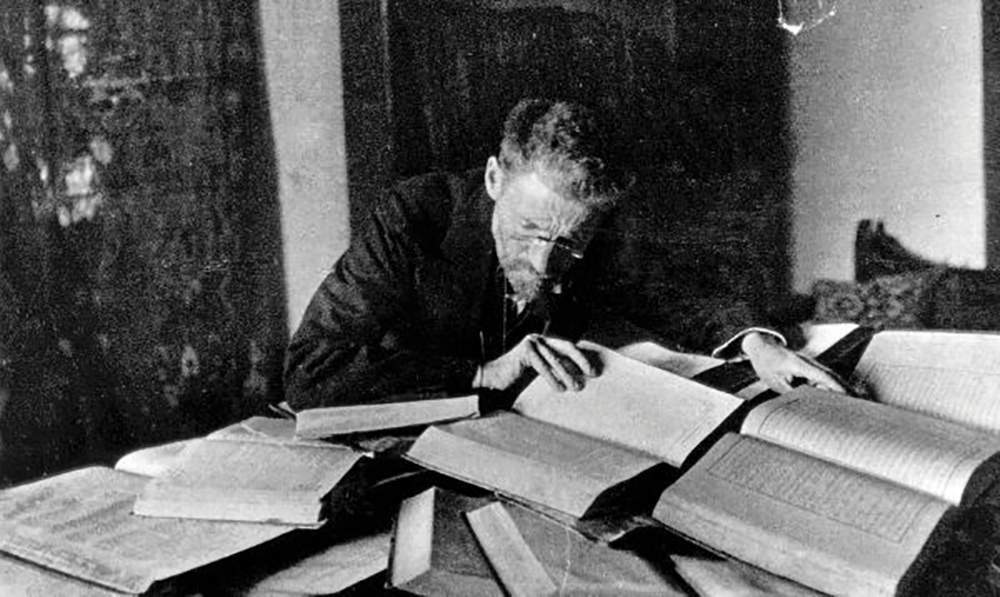
Eliezer Ben Yehuda 1858-1922
I had the great privilege of knowing Ehud Ben Yehuda as a dear friend when I lived in Jerusalem in the early 1970’s. I also knew his younger sister, Dola. Both were in their 70’s. They were two of the three living children of Eliezer and his second wife Hemda. The story of their father’s work and mission in life against unthinkable odds is both heartbreaking and heartwarming. There are many books about his accomplishments. My purpose is to describe the struggle this family underwent to raise the Hebrew language from the dead. Their story is a huge life lesson for those called to accomplish something extraordinary. I will present this incredible story in a series over the next few months.
What kind of person does it take to single-handedly resurrect a language which had been dead since the second century A.D.?
It is true that in the 19th century there were a great many Jews who knew how to read the Torah and rabbinical books in Hebrew, or at least mouth the letters in the prayer book—especially in Eastern Europe. The ancient texts were chanted by religious Jews, but for the most part, barely understood. In Jerusalem there were a few Sephardic Jews (from Arab countries) who could even speak some Hebrew, but with a limited ancient vocabulary lacking all modern concepts. No one even considered that Hebrew could be a living language. Not one Jew spoke it as his mother tongue. For all practical purposes, the language was dead.
In the 1880’s there was a babble of many foreign tongues spoken by a grand total of some 30,000 Jews who had come to the Holy Land from the four corners of the earth. Simply put, without Eliezer it is doubtful there would have ever been a revival, literally, a resurrection of spoken Hebrew. Therefore, Eliezer Ben Yehuda bears the title of “The Father of Modern Hebrew” throughout the Jewish world.
Born in Lithuania in 1858, Ben Yehuda, the youngest in his family, learned the Hebrew Scriptures on his father’s knee. He loved spending time with his father, and with a phenomenal mind, at the age of four he already knew significant portions of the Torah, the Talmud, and commentaries by heart.
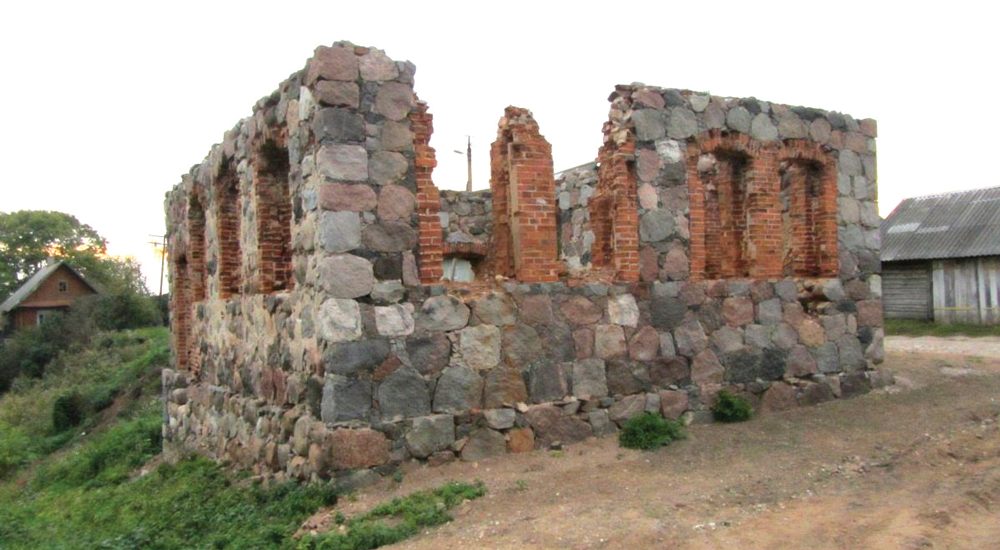
Ruins of a typical house in Luzhky, Lithuania, Eliezer Ben Yehuda’s birthplace.
But his father had tuberculosis and one day as he was studying the Torah with his four-year-old, he suddenly coughed up a huge amount of blood which covered the Torah page. His last words were, “Eliezer, my son, clean the Torah! Don’t bring dishonor to our sacred book.”
From that time on, the young child was sent to one religious boarding institution after another. He was always the best student wherever he studied. At one academy, his favorite Rabbi slipped him a rare book that was not religious, but translated into Hebrew—“Robinson Crusoe.” It was that book that ignited his belief that Hebrew could be a living language once again.
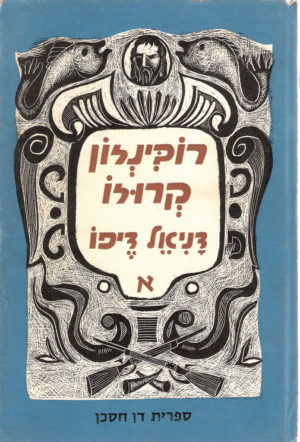
Robinson Crusoe, one of a tiny number of secular books translated into Hebrew in the 19th century – forbidden to religious Jews. (Picture is a modern translation)
In his memoirs he wrote,
“I fell in love with the Hebrew tongue as a living language. This love was a great and all-consuming fire that the torrent of life could not extinguish—and it was the love of Hebrew that saved me from the danger which awaited me on the next step of my new life.”
That next step came when he was slipped a short volume of Hebrew grammar by his favorite Rabbi who had dared to taste of non-religious books. Of course, his ultra-religious uncle with whom he lived was horrified that his nephew was straying into areas outside rabbinical literature, and in a rage, threw the 14-year-old boy out of his house, telling him never to return.
A CHANCE MEETING THAT WOULD CHANGE HISTORY
Devastated, Eliezer wandered through the night to a nearby town, went into the local synagogue, and fell asleep. A Jewish businessman, Solomon Jonas—more secular than traditional—approached him and invited him to his home. Eliezer was immediately drawn to his library, but found he could not understand a single word. The only alphabet he knew was Hebrew. Even his mother tongue Yiddish was written with the Hebrew alphabet.
Jonas took him in as a son. Recognizing his brilliant mind, the whole family participated in preparing him for an entrance examination to a state (secular) school, and after that, a university. Jonas’ daughter, Devora, was enlisted to teach him Russian and French—required for the state school. He taught himself mathematics and biology by reading books in his newfound languages. He excelled in school and made plans to attend university. Eliezer and Devora kept in touch by mail. For Devora, he was her prince.
He became very much a secularist, loving the great literary giants in Russian and French. No longer was he interested in Jewish things—except there was one thing he could not let go. He wrote, “That string was my love of the Hebrew language. Even after all things Jewish became foreign to me I could not keep away from the Hebrew tongue…”
A NEW MOVEMENT: “NATIONALISM”
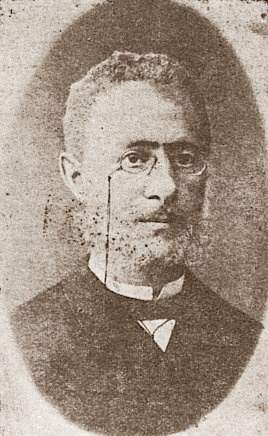
Solomon Jonas. Secular businessman, who by chance met the homeless Ben Yehuda and “adopted” him into his family.
Among the important events that lit a fire in this visionary was a rising “nationalist” movement among different peoples who wanted their own country. He saw how the Bulgarians were rebelling against their rulers, the Turkish Ottoman Empire, and he thought, if the Bulgarians who are not an ancient, classical people could demand and obtain a state of their own, then the Jews, the People of the Book and the heirs of historic Jerusalem, deserve the same.
In the middle of the night, as he was reading newspapers, he said, “Suddenly, as if lightning struck, an incandescent light radiated before my eyes…and I heard a strange inner voice calling to me: ‘The revival of Israel and its language on the land of the forefathers!’ This was the dream.”
He then read a unique and controversial book by the famous author George Eliot in 1876, calling for a homeland for the Jewish people. That was the deciding factor that crystalized his mission for life.
He would go to Paris to study medicine and become a doctor. With that career he would have a profession to earn a living for himself and his family. He planned to marry Devora, and they would go to live in Jerusalem.
HIS CATHOLIC CONFIDANT
Thus in 1878, Eliezer began his medical studies at the Sorbonne. He was penniless, but found an attic to rent and ate one meal a day. He spent his days studying in libraries across Paris. Visiting a Russian library he met a new friend, a Russian/Polish Catholic journalist, Tchatchnikof, who promptly adopted him, and opened for him the door to French literary society, introducing him to such literary giants as Victor Hugo.
It was a rare friendship because of the long history of anti-Jewish teachings by the church and state-approved anti-Semitism throughout Europe. Jews associated with Jews. But Tchatchnikof became a bosom friend, coaching him in the art of journalism and also giving Eliezer occasional work to help him support himself. Most interesting, Tchatchnikof began pushing the visionary towards acting on his dream of a Jewish homeland.
The journalist asked his friend, “Are there any other Jews who long to see their national life reborn?” Eliezer’s answer was, “All Jews believe they will return to their land when the Messiah comes.” But, he added, the educated “enlightened” Jews [who might have the means to do something] tend to assimilate, out of the fold.
The Pole then asked if anyone had ever published the idea of Zion returning to its land. Eliezer explained there was a Hebrew periodical called “Hamagid.”
“So, can you write in Hebrew?” When Eliezer admitted he was not sure how good he would be, the Catholic journalist countered, “If you can express yourself in Hebrew, you can write the article. Maybe that is why we have been brought together at this time, in this city which is the center of liberal nationalism.”
When Eliezer suggested someone else could do it, Tchatchnikof burst out, “This is childish foolishness! Whoever has the first inspiration must be the one to state the case and get it published. Go to it, and let’s have no more argument about it.”
Eliezer wrote the article and sent it to “Hamagid,” which turned it down. Despondent and also realizing his health was deteriorating, he felt that a little light had been lit, and then extinguished. He fell into depression, seeing himself as just another Parisian who succumbed to poverty and ill health.
HIS FRIEND: DON’T GIVE UP!
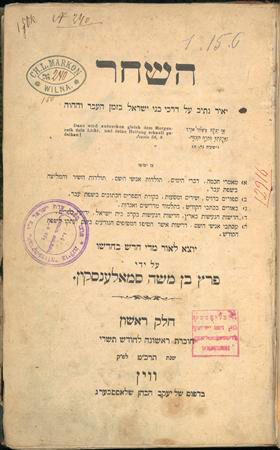
“HaShahar” (“The Dawn”), a Hebrew newspaper which printed Eliezer Ben Yehuda’s first article calling for a land and a language for the Jewish people.
But Tchatchnikof became angry. “You show none of the hope and resilience that are the hallmarks of the Jews. You cannot give in, and you dare not lose hope. There must be another publication in Hebrew somewhere to which you can send your article,” he said. And there was. Eliezer sent his manuscript to “The Dawn,” a Hebrew periodical in Vienna, and his article was accepted for publication.
A few weeks later, Tchatchnikof came to visit his friend and found he had been spitting up blood. He had contracted tuberculosis, very possibly years before from his father.
Eliezer told his journalist friend, “Too bad! I have just received a letter from ‘The Dawn’ publisher who stated, ‘I was very pleased with your article, and I am sure that you are destined for great achievements.’” “But,” said Eliezer, “it is too late. I am spitting up blood—a sure sign of tuberculosis.”
Instead of sympathy, Tchatchnikof went into a rage. “Did you go to a doctor? Are you sure it is tuberculosis—and do you know for a fact that it is fatal?” The Polish journalist took him to his own doctor who sent him to a specialist. The diagnosis was that Eliezer had six months to live.
“Well, that’s that—I will die in six months” Again, Tchatchnikof was furious. “You must not die,” he declared. “Too many liberation movements were stillborn because their creator failed to insure his own survival.”
He reminded Eliezer of the great Jewish philanthropist, Baron Edmond Rothschild, who helped Jews in need. Eliezer was hesitant to ask for help, but the journalist himself petitioned Rothschild, who sent the sick man to his hospital in the warm city of Algiers. He recovered his strength and began writing more articles.
Tchatchnikof came to visit him in Algiers, and Eliezer read him his third article. Here are a few lines:
Let us therefore, revive the language and plant it in the mouths of our youths and they will never betray it—but we shall not be able to revive the Hebrew language except in the land where the Hebrews form a majority of the inhabitants. Let us therefore, increase the number of Jews in our desolate land; let us return the remnant of our people to the land of their forefathers; let us bring back to life the nation—and the language will live, too!
If we revive the nation and return it to its land—the Hebrew shall live, too! For in the end, this is the only path to final redemption—and without that redemption we are lost, lost forever.
Tchatchnikof exclaimed: “Eliezer, what a shame you are not a Polish Catholic! You could become the youngest saint of our people…I hope your people will realize what words of prophecy you are uttering. In your voice I hear Jeremiah and Amos, Isaiah and Ezekiel. I have never felt one way or another about the Jews—but now I know that the seed of the prophets is still alive. Your people shall know the redemption you talk of—and you shall be known as a prophet of that redemption.”
Eliezer won another influential ally—Peretz Smolenskin, the author and publisher of “The Dawn.” After reading the logic and the passion in Ben Yehuda’s articles and then watching in horror the terrible pogroms in Russia, he realized the only answer was a land and a language that belonged to the Jewish people.
Back in Paris, Eliezer prepared to leave for Jerusalem. “It would be the height of hypocrisy for me to call my people to return to their desolate land while I myself stay in Paris.” Tchatchnikof encouraged him and even gave him money to make the trip to the Holy Land.
Sadly, Eliezer knew he must terminate his relationship with Devora Jonas, the love of his life. As a man with tuberculosis, he might die at any time, or worse, pass the disease onto a wife. Anyway, he would not be able to support a wife and family.
He wrote a letter to Solomon Jonas, the father of Devora, and explained that though for years he had planned to marry Devora, he now released her because of his sickness. He also explained that he was leaving to live in Jerusalem. He wrote, “I do not know what I shall do when I get to the Holy Land—I only know that I must go there.”
He continued,
“I have no choice but to terminate my promise to your daughter. Please believe me, sir; I am not doing this out of baseness. I have not fallen out of love with her. She is still very much in my heart—but I can no longer offer her anything! I cannot promise her a home and a family. Nor can I offer her a long marriage. Indeed, if she marries me, my doctors inform me, she may fall victim to this cursed illness of mine. Please sir, in your kindness, act as my messenger and convince your dear daughter that she must forget me and find another, more worthy man to love and marry. I shall pray that she is happy. Believe me, sir; she is better off without me.”
The story will continue in the October 2018 issue.
*I have leaned heavily for source material from “Fulfillment of Prophecy, The Life Story of Eliezer Ben Yehuda 1858-1922”, as it is written by Eliezer Ben Yehuda, grandson of the Eliezer Ben Yehuda, because he received first-hand information in great detail from his grandmother, Hemda Ben Yehuda.
Other articles in the Ben Yehuda series:
Part 2: Eliezer Ben Yehuda: The Visionary
Part 3: The World’s Very First “Hebrew Child”
Part 4: Jerusalem’s Orthodox Jews vs. Eliezer Ben Yehuda
Part 5: Ben Yehuda’s New Virtuous Wife / Eliezer Ben Yehuda Meets Theodore Herzl
Part 6: Eliezer Ben Yehuda’s Destiny: Two Steps Forward, One Step Back
Part 7: The Secret to His Success
Thank you for providing us the opportunity to publishREDEEMING LOVE BY FRANCINE RIVERS

Paid in full: $19,062
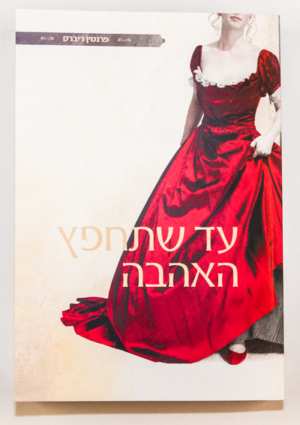 My name is Anat Brener. For twelve years I have been serving the Lord ministering to people involved in prostitution and drugs near the Old Central Bus Station in Tel Aviv.
My name is Anat Brener. For twelve years I have been serving the Lord ministering to people involved in prostitution and drugs near the Old Central Bus Station in Tel Aviv.
For the last six years, our organization, “Chayim Be’Shefa” (Abundant Life), has been operating a day center called “The Red Carpet.” The girls who come to the center are involved in prostitution; they are drug addicts and homeless. They come to receive food, take a shower, treat their hair and nails, get some clean clothes, and sleep. They know of our faith and allow us to pray for them on a regular basis.
A number of years ago I read the book, “Redeeming Love” by Francine Rivers. This book deeply touched my heart and expressed for me the love of God, which is redeeming, setting free, and unconditional—no matter how deep we fall into sin and suffering in our lives.
The book was recently translated into Hebrew by Maoz. I decided to purchase multiple copies in order to distribute them in the area where we minister. I passed them out to all the humanitarian organizations working with girls in prostitution, distributed them to the girls themselves (those who can read), and to everyone who has a heart to serve and help.
I have been giving out the books in rehabilitation centers, as well, and I believe it will touch hearts, reflecting God’s redeeming and saving love. I have no doubt that God’s love for these girls is the key for them to escape the circle of prostitution and drug abuse.
Anat Brener
www.abundantlife.org.il
BRAND NEW FAITH BOOKS IN HEBREW
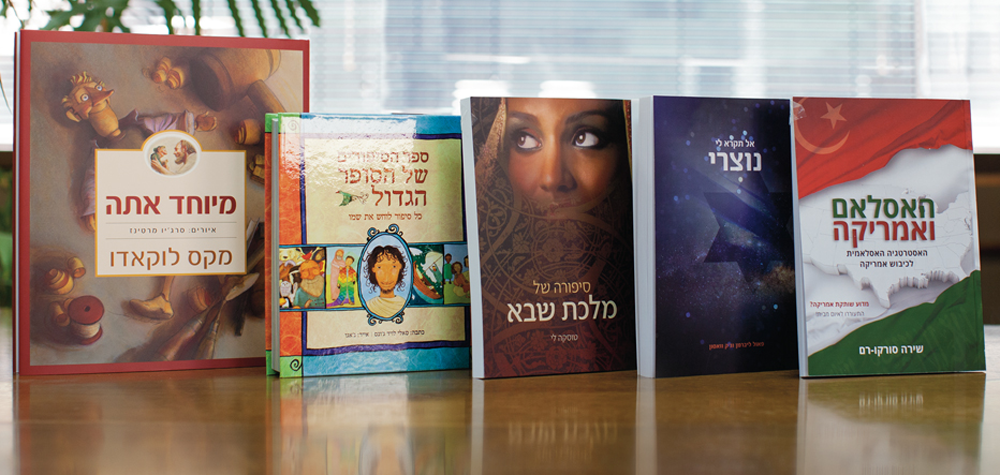
Books finished and published!
You Are Special – Paid in full: $8,706
Jesus Storybook Bible – Paid in full: $16,871
Legend of Sheba – Paid in full: $15,393
Don’t Call Me Christian – Paid in full: $5,903
The Islamic Strategy to Conquer America – Paid in full: $11,159
Books in Progress
$38,752 will put all of these books in 20 Congregations and on the Maoz Books website. We are also able to put them on digital internet for approximately $1,500 each.
 A Hope and a Future
A Hope and a Future
by Jonathan Bernis
The walk of a true believer is even more than salvation and the promise of eternal life. It is about abundant life as well. Genuine hope is not wishful thinking. Through this compelling teaching, believers will better understand the specifics of God’s commitment to bring them through difficult times and help them to fulfill their ultimate destiny while on this earth.
PAID IN FULL! $15,104
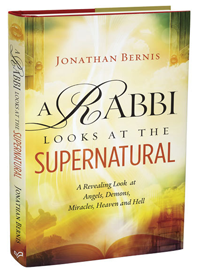 A Rabbi looks at the Supernatural
A Rabbi looks at the Supernatural
by Jonathan Bernis
We are very excited that more and more really great books are being written by Jewish believers. Jonathan Bernis of Jewish Voice has taken on the subject of the supernatural—a subject that few Jewish people understand or are even aware of. A much needed book for both Israeli believers and non-believers.
TOTAL COST: $12,330
LEFT TO PAY: $8,611
 A Rabbi looks at the Afterlife
A Rabbi looks at the Afterlife
by Jonathan Bernis
A second book by Bernis on an incredibly important subject. In our opinion, there is no more important subject to teach, preach or witness on than life after death. Bernis takes the reader on an unforgettable journey of faith, exploring Scripture, history, and first-hand accounts of those who have experienced the afterlife.
TOTAL COST: $15,300
LEFT TO PAY: $11,075
 The Islamic Antichrist
The Islamic Antichrist
by Joel Richardson
Joel Richardson is one of the most balanced and knowledgeable voices in the world today concerning prophetic and end times insight. Even though this book is a message to believers around the world, revealing Islamic theology concerning their coming “messiah,” This will be a shocker for many Jews—believers and non-believers—who will be changed through the research and message of this book.
TOTAL COST: $13,743
LEFT TO PAY: $3,032
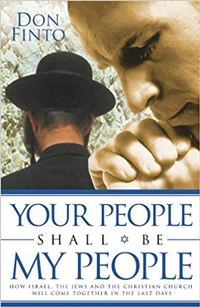 Your People Shall Be My People
Your People Shall Be My People
by Don Finto
If ever you want to give a book to a Jewish friend written by a non-Jewish true lover of Israel, this is the one! Finto exquisitely reviews God’s eternal love for Israel, and then explains that every born-again Christian who loves God and knows His heart through the Scriptures, will also passionately love and care for Israel and Israelis. A great book for Jewish non-believers.
TOTAL COST: $11,912
LEFT TO PAY: $7,687
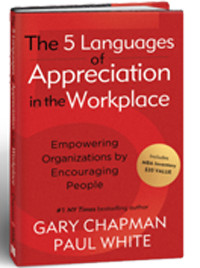 The 5 Languages of Appreciation in the Workplace
The 5 Languages of Appreciation in the Workplace
by Gary Chapman – Paul White
So essential for Jewish believers in Yeshua, the #1 New York Times bestseller will dramatically improve workplace relationships simply by learning one’s coworkers’ language of appreciation. Most problems in organizations flow from this question: do people feel appreciated? This book will help you answer “Yes!” and will enhance the testimony of believers in the workplace.
TOTAL COST: $14,774
LEFT TO PAY: $8,347
NOAAN ORTHODOX ISRAELI WOMAN FOLLOWS YESHUA
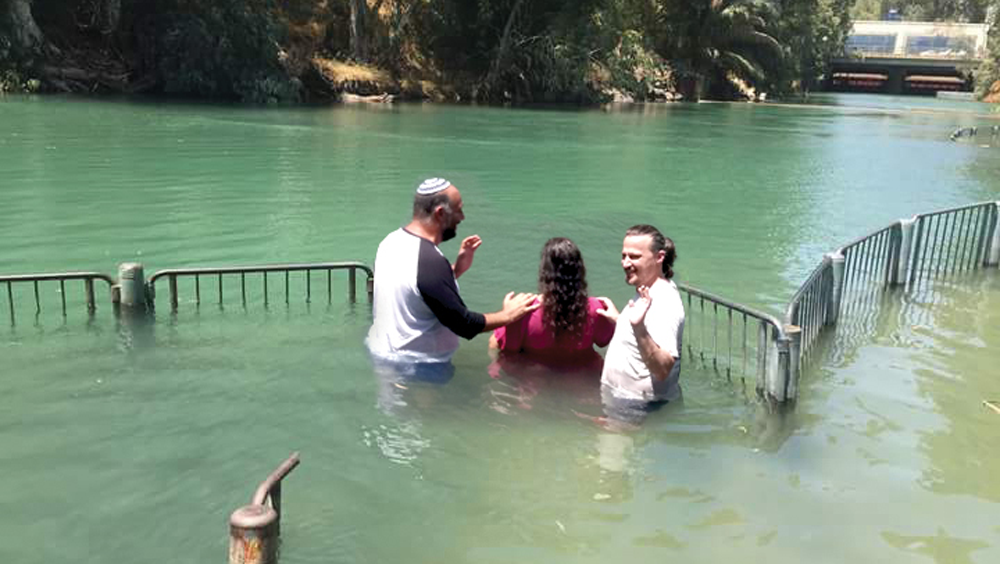
Moti Cohen (left) and Ido Bar attend the immersion of Noa (not her real name).
A few months ago, my good friend Ido, who is a new believer at our congregation, had to give a speech in the framework of a course he was taking. During his speech, he decided to share about the process of deliverance he had experienced at Tiferet Yeshua. Even though he did not mention the name of Yeshua, it was clear that there would be people from the audience who would ask him for more details at the end of his speech.
Noa, who was visibly Orthodox, approached Ido after his lecture and began asking him questions about the congregation and what he meant by “deliverance.” Ido joyfully told her about his faith in Yeshua and invited her to come to the congregation.
Noa came and loved learning about Yeshua. She loved the praise and worship—it is so different than the repetitive liturgical singing in the synagogue where every aspect of the service is dictated by a strict traditional format. Slowly, Noa began to understand that faith in Yeshua was not a “foreign import” but rather a faith that is firmly rooted in Judaism, that all of the first believers were Jews and our faith is based on the Hebrew Scriptures and the New Testament—a book also written by Jews.
Noa began a discipleship course I lead which delves into the fundamentals of faith in Yeshua, such as Yeshua’s sacrifice, repentance, messianic prophecies in the Hebrew Scriptures, the importance of studying the Word of God, and, finally, the importance of water immersion.
Interestingly, Ido joined some of the lessons and even took part in discipling Noa. Although he is a relatively new believer, it is clear that Ido has a gift for evangelism and discipleship. For me, it was a very special experience to see a man, who just recently became a disciple himself, lead someone to faith in Yeshua and begin discipling them. It is important to understand that for religious Jews, praying means reciting prayers written in the prayer book called the Siddur. In Orthodox Judaism, prayer is central and important, but there is no such thing as simply talking and communing with God through prayer. Every prayer in Orthodox Judaism is written out in a pre-prescribed format, determining when and what one should pray throughout the day.
Religious girls are exempt from some of the mandatory prayers that observant men must pray throughout the day. However, every morning when Noa woke up she would recite the prayer “Modeh Ani,” a prayer thanking God for waking up in peace. After each meal Noa would pray “Tfilat Mezuman” thanking God for food. There are many more prescribed, mandatory prayers in Judaism, some of which are profoundly beautiful, but none of which come from a personal, spontaneous heart-cry to God.
At Tiferet Yeshua, Noa was exposed to a different type of prayer, one which she had never experienced before, having only ever read prescribed prayers from the page. Noa loved how we prayed in the congregation, but she did not succeed at first in praying spontaneously. However all that changed during one of our services; towards the end of the sermon that day. The entire congregation divided into small groups in order to pray about a number of topics—and also to pray for one other. Noa was in one of the groups and really enjoyed hearing the spontaneous, personal prayers that people in her group prayed. When her turn came, she simply opened her mouth and, for the first time in her life, began to pray directly from a heart overflowing with love. She was overjoyed that God had given her the ability to pray a personal prayer from her heart!
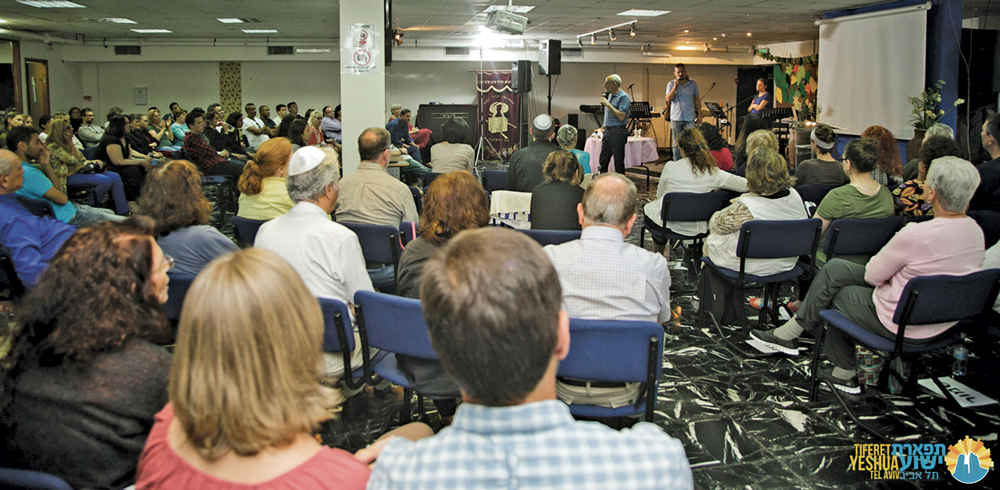
Congregation Tiferet Yeshua in downtown Tel Aviv.
Praise God! One more Israeli knows how to petition heaven!
Last week we went to the Jordan River near Tiberias where Noa would be immersed in water. She was so excited about this special day. Ido came with us along with two cars full of witnesses. It was important that Ido immerse Noa with me because he was the one who led her to Yeshua. We explained to Noa that at the time of immersion we identify with the death of Yeshua, signifying the death of the old man, with all his lusts and sinful desires. And as soon as we come out of the water we identify with the resurrection of Yeshua from the dead (Romans 6: 6) and begin to live, by the power of the Holy Spirit, a new life (Romans 6:4).
Noa proclaimed that she was dedicating her life to the Messiah of Israel, Yeshua. She thanked God for her new salvation and went into the water. It was a powerful and holy moment, and there was really a strong presence of the Holy Spirit at the time of her immersion. God filled us with joy which was a sign to us of how happy He was that this “daughter of Zion” had made a decision to follow His ways. We sang and prayed together and returned all the way to Tel Aviv with great joy and peace in our hearts.
Messianic Jewish Alliance of America 2018WHAT THE MJAA CONFERENCE MEANT TO ME
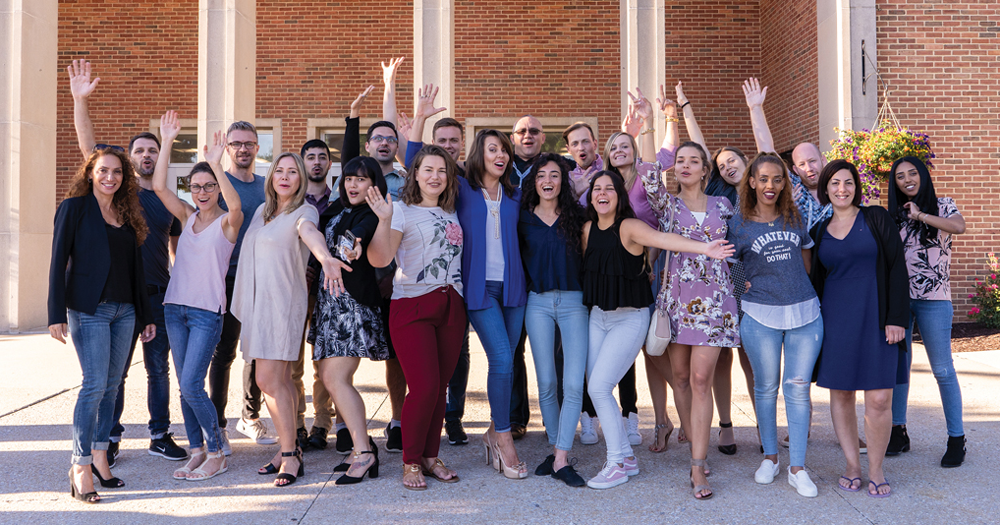
The Israeli delegation
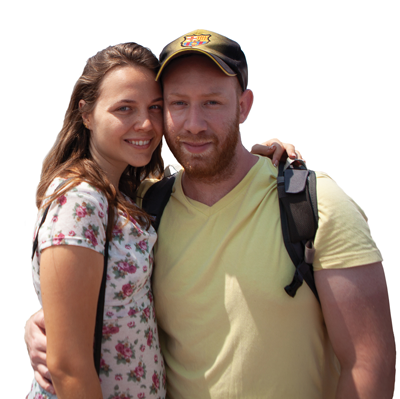 We have been married for almost a year and live near Haifa. Both of us are 28 years old and professional English teachers. About two months before the flight to the U.S. we realized that Dana is pregnant, and we considered canceling the trip out of concern for the wellbeing of our baby. We prayed, decided to go anyway, and were blessed due to this decision.
We have been married for almost a year and live near Haifa. Both of us are 28 years old and professional English teachers. About two months before the flight to the U.S. we realized that Dana is pregnant, and we considered canceling the trip out of concern for the wellbeing of our baby. We prayed, decided to go anyway, and were blessed due to this decision.
I was born into a believing family in the Haifa area, and Yoni came to faith after me. Because Yoni is still new in the faith, and comes from a strongly atheistic background, at first he doubted the significance and purpose of this conference.
However, he felt God had a reason for us to go, and that he should attend the conference with a positive mindset. The general experience of the conference was amazing and awakened deep feelings, thanks to the powerful love showered upon our Israeli group.
We met Russell, a congregational leader in the U.S., who befriended Yoni at the volleyball game. We had lengthy discussions concerning the body of Messiah in Israel, and about life in Israel in general.
He was so excited about all he heard, and the next morning he told us he’d prayed for us all night, and then he started to cry; he cried for a long time. As we left, he blessed us, prayed for us and asked to have a picture taken with us, to share his testimony with his local congregation.
All in all, the conference was amazing; the spirit of love, giving, sharing, listening, with a special emphasis of love for Israel and those of us living there. We were very blessed to be there (and how much more at the special Israeli evening!), and we sensed the presence of God blessing every speaker, every activity, and even every meal.
The local staff, and the staff of MJAA always gave us the feeling of belonging and acceptance. With Yoni, I saw his faith had significantly strengthened, and he received answers to many questions. In spite of his concerns, he received much more than he had expected both spiritually and physically. I gained a deeper understanding of the significance of the Jewish nation for the salvation of other nations, because in Israel there is a feeling that Jewishness is taken for granted with no universal purpose.
We want to give our heartfelt thanks to the generous donors, without whose help this amazing trip would not have happened. We made close friends within our Israeli group and also met others from several other countries.
We recommend as many Israeli believers as possible take part in this empowering experience. In the name of Yeshua we thank and bless all the amazing donors for one of the most incredible experiences of our lives!
Yoni & Dana Majlin
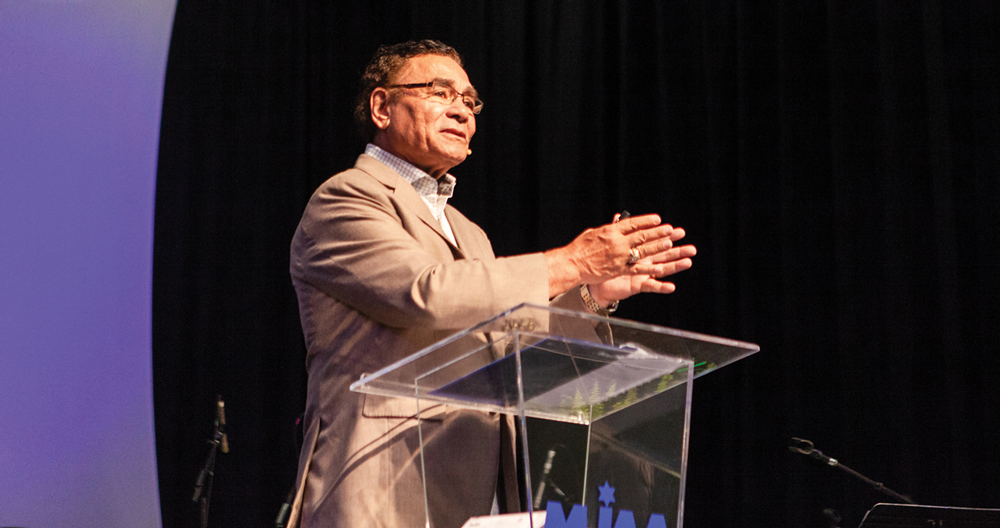
 This special trip to the U.S. was exciting and an incredible blessing for me, having just finished the army. People who’d never met us before loved us, honored us and prayed for us, just because we were from Israel.
This special trip to the U.S. was exciting and an incredible blessing for me, having just finished the army. People who’d never met us before loved us, honored us and prayed for us, just because we were from Israel.
Their love caused me to appreciate and understand how important it also is to pray for them and for the conference, and for all those who’d given donations so we could come and receive so much during just two short weeks.
I want to send a big “Thank You” to all the donors for your love and faithfulness to Yeshua and to Israel.
Emily Manpel
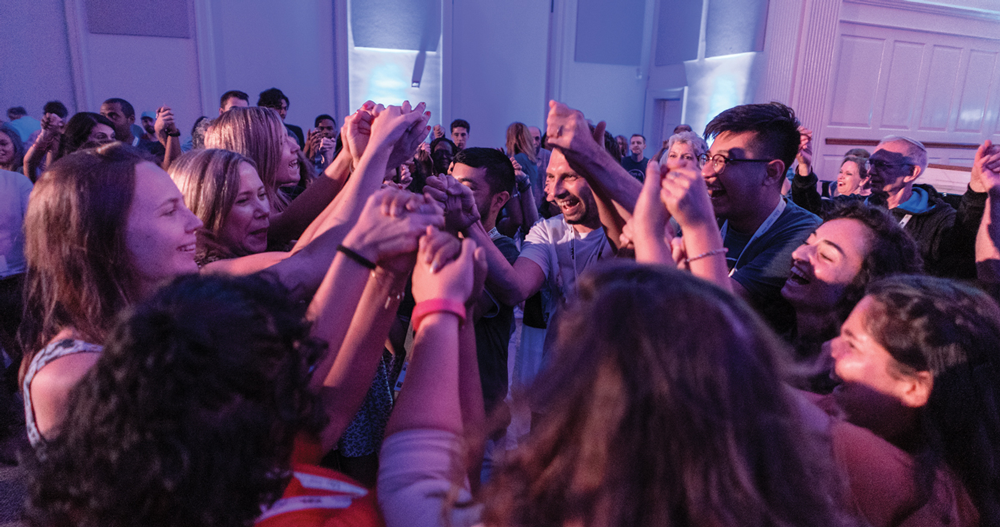
September 2018
Dear Maoz Partner,
Happy New Year 5779! We are one year closer to the Coming of Messiah!
This month we have shared with you an important part of Maoz’ ministry—publishing books of faith to encourage and equip Israeli believers, as well as books to reach the lost.
When we published our first series of Hebrew books in 1978, it seemed completely absurd.
To put thousands of dollars into printing a series called “Through the Bible” by Gordon Lindsay (my father) seemed irrational. After all, in the 70’s there were only a few hundred Messianic Jews in Israel at best, and only a handful spoke Hebrew. The rest were immigrants, mostly from the U.S. and Europe, who read their Bibles and books in their mother tongue.
But we knew, according to Bible prophecies, there is coming a great revival of Israelis who would believe in our Yeshua the Messiah. We felt deep in our hearts we were the ones to help prepare for the multitudes who would come to faith, and books in Hebrew would be of vital importance! In fact, God has used Maoz Publishing to print tens of thousands of books to give to non-believers sharing testimonies of Jews coming to faith!
So from that day to this, we have been translating, editing, typesetting and publishing faith-based books to help Israeli Jewish believers grow in maturity, and to bring the lost to receive the great gift of Salvation through Yeshua.
Today we have a wonderful selection of Hebrew books on our website at www.maozstore.co.il. We also have a fast-growing audience purchasing our electronic books on the Internet. As quickly as we can raise the funding, we put them on Amazon and on a large secular Hebrew electronic outlet. This means more and more non-believers are being exposed to the Gospel!
Our goal is also to get the books out to the Messianic Jewish Body for them to read and grow in their faith. In the 20 Hebrew-speaking Messianic congregations that carry our books, we offer them free to those who are not able to purchase them!
But may we be honest with you? Each book we undertake is an expensive project and the process can take 18 months or more from beginning to end. We are not publishing to make a profit! We publish books to strengthen our Messianic Hebrew-speaking community and to reach the lost—any and every way we possibly can.
These books will be used to advance God’s Kingdom until Yeshua, King of the Jews, returns to earth. These books are here for the long haul!
For the books mentioned above, we need $38,752 to finish them and get them out to Israelis across our nation.
Will you help us? One thing we know in our hearts and see in the Spirit: Bible Days are here again! The harvest is very ripe!
May God bless you this coming New Year!
Ari & Shira Sorko-Ram